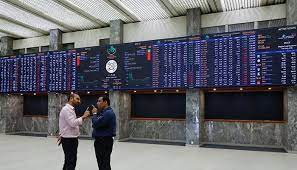KARACHI: On Friday, the final trading day of the week, the bulls made a comeback at the Pakistan Stock Exchange (PSX), as traders selected stocks that had lost value during the previous bearish phase.

The benchmark KSE-100 index fluctuated between optimism and pessimism, letting loose the bulls who eventually moved the stock exchange into the green.
Investors closely followed political news as Punjab came to the forefront prior to the election for chief minister.

Since the morning bell rang, the KSE-100 index has increased, but there have been periodic dips. Midday saw an increase in the upward trend as the index again broke through the 42,000-point threshold.bulls
The benchmark KSE-100 index increased by 245.55 points or 0.62 percent to close at 40,077.30 points.
Bulls stage at PSX

According to a report from Arif Habib Limited, inflationary and political worries caused a bearish momentum in the market during the first session.
The benchmark KSE-100 closed in the green, according to the brokerage house, but the bulls made a comeback in the second session for value hunting across the board.
Although decent volumes were seen in the third-tier stocks, mainboard volumes remained dull.
Fertilizer (+83.2 points), technology (+70.5 points), chemical (+30.2 points), exploration and production (+27.6 points), and cement (+26.9 points) are some of the industries that have contributed to the performance.
During the session, shares of 317 different companies were traded. 226 scrips closed in the green at the close of trading, 72 in the red, and 19 were unchanged.
Compared to Thursday’s total of 157.99 million shares, total trading volume increased to 171.27 million shares. Shares traded during the day were worth Rs. 4.73 billion.

The company with the most shares traded in terms of volume was WorldCall Limited Telecom, which lost 0.01 rupees to close at 1.20. Unity Foods traded 18.96 million shares, gaining Rs. 1 to close at Rs. 17.77, and TPL Properties traded 16.81 million shares, gaining Rs. 6 to close at Rs. 16.87, respectively.bulls
Previous reports state that political uncertainty hurts the Pakistani rupee and the PSX. The Pakistani rupee continued to lose value on Wednesday after breaking all previous records, falling to Rs226 after losing 4.1 against the US dollar in the interbank market.
Tuesday’s interbank trade saw the Pakistani rupee plunge to an all-time low of 224 against the dollar before closing at 221.99.
Following the currency’s decline of Rs6.80 on June 26, 2019, it experienced its highest day-to-day depreciation. In the meantime, the KSE-100 index on the Pakistan Stock Exchange experienced a downward trend, dropping 248 points to 40,140 points.bulls
The crushing defeat of the ruling PML-N in the Punjab by-elections has led to political unrest and increased import demand, which has caused the Pakistani rupee to depreciate.
Analysts contend that there are additional factors at work in addition to the domestic political and economic environment.
Alpha Beta Core

According to Alpha Beta Core CEO Khurram Schezad, “the dollar is getting stronger in the global market almost against all the world currencies, and the Pakistani rupee is not the exception.”
Schezad stated, in reference to Pakistan’s financial situation, that the country’s external account issues “are not settled as yet, the IMF (International Monetary Fund) is yet to be on board, and the flows are yet to materialise.”bulls
The economy has been given a poor rating by international rating agencies, which adds to the pressure on the financial markets in general and the foreign exchange market in particular.
Malik Bostan, the chairperson of the Exchange Companies Association of Pakistan (ECAP), stated that there were three causes for the ongoing devaluation of the local currency.
forex expert

According to the forex expert, investors are uneasy right now because the future of the current system is uncertain because the opposition PTI won more seats in the Punjab by-elections than the ruling PML-N.
Bostan continued by saying that the devaluation has been made worse by rumours that it would take some time for the IMF Executive Board to approve the proposal and by the lender’s declaration that it was prepared to negotiate with a caretaker government.
He added that Pakistan has helped the Taliban with trade since they have taken control of Afghanistan, which has put additional pressure on the rupee.
State Bank of Pakistan

The State Bank of Pakistan (SBP), according to the currency trader, is unable to intervene in the rising rupee-to-dollar parity because the nation has agreed that the central bank won’t do so.
But even if it wanted to intervene, he continued, “the SBP does not have enough dollars to inject into the market.” He also said that if the government wanted to preserve the rupee, it would need to limit imports.


